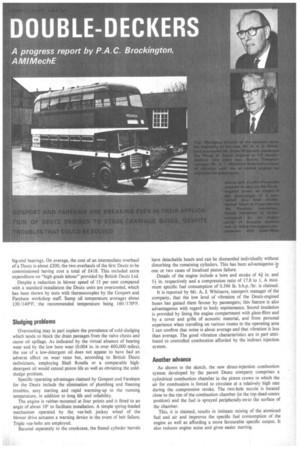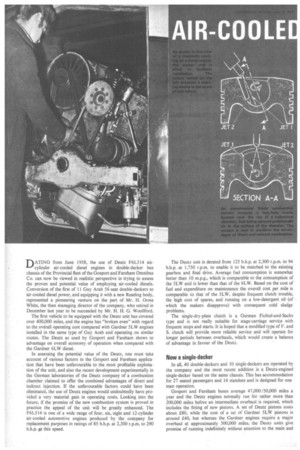DOUBLE-DECKERS
Page 71

Page 70

If you've noticed an error in this article please click here to report it so we can fix it.
A progress report by Brockington, AMIMechE
ATING from June 1958, the use of Deutz F6L514 six-1-d" cylinder air-cooled diesel engines in double-decker bus chassis of the Provincial fleet of the Gosport and Fareham Omnibus Co. can now be viewed in realistic perspective in trying to assess the proven and potential value of employing air-cooled diesels. .Conversion of the first of 11 Guy Arab 56-seat double-deckers to air-cooled diesel power, and equipping it with a new Reading body, represented a pioneering venture on the part of Mr. H. Orme White, the then managing director of the company, who retired in December last year to be succeeded by Mr. H. H. G. Woollford.
The first vehicle to be equipped with the Deutz unit has covered over 400,000 miles, and the engine has "broken even" with regard to the overall operating cost compared with Gardner 5LW engines installed in the same type of Guy Arab and operating on similar routes. The Deutz as used by Gosport and Fareham shows to advantage on overall economy of operation when compared with the Gardner 6LW diesel.
In assessing the potential value of the Deutz, one must take account of various factors in the Gosport and Fareham application that have been unfavourable to the most profitable exploitation of the unit, and also the recent development experimentally in the German laboratories of the Deutz company of a combustion chamber. claimed to offer the combined advantages of direct and indirect injection. If the unfavourable factors could have been eliminated, the use of Deutz engines would undoubtedly have provided a very material gain in operating costs. Looking into the future, if the promise of the new combustion system is proved in practice the appeal of the unit will be greatly enhanced. The F6L514 is one of a wide range of four, six, eight and 12-cylinder air-cooled automotive engines produced by the company for replacement purposes in ratings of 85 b.h.p. at 2,300 r.p.m. to 290 b.h.p. at this speed.
The Deutz unit is derated from 125 b.h.p. at 2,300 r.p.m. to 94 b.h.p. at 1,750 r.p.m. to enable it to be matched to the existing gearbox and final drive. Average fuel consumption is somewhat better than 10 m.p.g., which is comparable to the consumption of the 5LW and is lower than that of the 6LW. Based on the cost of fuel and expenditure on maintenance the overall cost per mile is comparable to that of the 5LW, despite frequent clutch trouble, the high cost of spares, and running on a low-detergent oil (of which the makers disapprove) with consequent cold sludge problems.
The single-dry-plate clutch is a German Fichtel-and-Sachs type and is not really suitable for stage-carriage service with frequent stops and starts. It is hoped that a modified type of F. and S. clutch will provide more reliable service and will operate for longer periods between overhauls, which would create a balance of advantage in favour of the Deutz.
Now a single-decker
In all, 40 double-deckers and 10 single-deckers are operated by the company and the most recent addition is a Deutz-engined single-decker based on the same chassis. This has accommodation for 27 seated passengers and 14 standees and is designed for oneman operation.
Gosport and Fareham buses average 47,000/50,000 miles a year and the Deutz engines normally run for rather more than 200,000 miles before an intermediate overhaul is required, which includes the fitting of new pistons. A set of Deutz pistons costs about £80, while the cost of a set of Gardner 5LW pistons is around £40, but whereas the Gardner engines require a major overhaul at approximately 300,000 miles, the Deutz units give promise of running indefinitely without attention to the main and big-end bearings. On average, the cost of an intermediate overhaul of a Deutz is about £200, the two overhauls of the first Deutz to be commissioned having cost a total of £418. This included extra expenditure on "high-grade labour" provided by British Deutz Ltd.
Despite a reduction in blower speed of 15 per cent compared with a standard installation the Deutz units are overcooled, which has been shown by tests with thermocouples by the Gosport and Fareham workshop staff. Sump oil temperature averages about 130/140°F, the recommended temperature being 160/170°F.
Sludging problems
Overcooling may in part explain the prevalence of cold-sludging which tends to block the drain passages from the valve chests and cause oil spillage. As indicated by the virtual absence of bearing wear and by the low bore wear (0.004 in. in over 400,000 miles), the use of a low-detergent oil does not appear to have had an adverse effect on wear rates but, according to British Deutz technicians, employing Shell RoteIla or a comparable highdetergent oil would extend piston life as well as obviating the coldsludge problem.
Specific operating advantages claimed by Gosport and Fareham for the Deutz include the elimination of plumbing and freezing troubles, easy starting and rapid warming-up to the running temperature, in addition to long life and reliability.
The engine is rubber-mounted at four points and is fitted to an angle of about 100 to facilitate installation. A simple spring-loaded mechanism operated by the vee-belt jockey wheel of the blower drive actuates a warning device in the event of belt failure. Triple vee-belts are employed.
Secured separately to the crankcase, the finned cylinder barrels have detachable heads and can be dismantled individually without disturbing the remaining cylinders. This has been advantageous in one or two cases of localized piston failure. Details of the engine include a bore and stroke of 41 in. and 54 in. respectively and a compression ratio of 17.8 to 1. A minimum specific fuel consumption of 0.396 lb. b.h.p. /hr. is claimed.
It is reported by Mr. A. J. Whittacre, transport manager of the company, that the low level of vibration of the Deutz-engined buses has gained them favour by passengers; this feature is also advantageous with regard to body maintenance. Sound insulation is provided by lining the engine compartment with glass-fibre and by a cover and grille of acoustic material, and from personal experience When travelling on various routes in the operating area I can confirm that noise is about average and that vibration is less than average. The good vibration characteristics are in part attributed to controlled combustion afforded by the indirect injection system.
Another advance
As shown in the sketch, the new direct-injection combustion system developed by the parent Deutz company comprises a cylindrical combustion chamber in the piston crown in which the air for combustion is forced to circulate at a relatively high rate during the compression stroke. The two-hole nozzle is located close to the rim of the combustion chamber (in the top-dead-centre position) and the fuel is sprayed peripherally on to the surface of the chamber.
This, it is claimed, results in intimate mixing of the atomized fuel and air and improves the specific fuel consumption of the engine as well as affording a more favourable specific output. It also reduces engine noise and gives easier starting.




























































































































